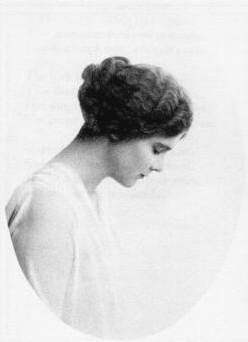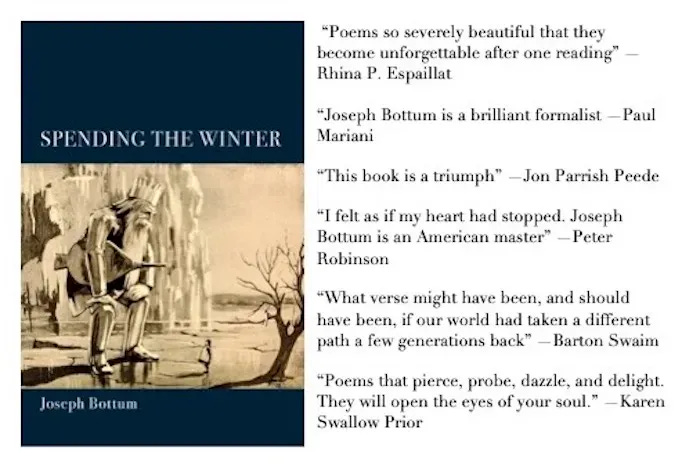
Wild Peaches
by Elinor Wylie
1 When the world turns completely upside down You say we’ll emigrate to the Eastern Shore Aboard a river-boat from Baltimore; We’ll live among wild peach trees, miles from town, You’ll wear a coonskin cap, and I a gown Homespun, dyed butternut’s dark gold color. Lost, like your lotus-eating ancestor, We’ll swim in milk and honey till we drown. The winter will be short, the summer long, The autumn amber-hued, sunny and hot, Tasting of cider and of scuppernong; All seasons sweet, but autumn best of all. The squirrels in their silver fur will fall Like falling leaves, like fruit, before your shot. 2 The autumn frosts will lie upon the grass Like bloom on grapes of purple-brown and gold. The misted early mornings will be cold; The little puddles will be roofed with glass. The sun, which burns from copper into brass, Melts these at noon, and makes the boys unfold Their knitted mufflers; full as they can hold Fat pockets dribble chestnuts as they pass. Peaches grow wild, and pigs can live in clover; A barrel of salted herrings lasts a year; The spring begins before the winter’s over. By February you may find the skins Of garter snakes and water moccasins Dwindled and harsh, dead-white and cloudy-clear. 3 When April pours the colors of a shell Upon the hills, when every little creek Is shot with silver from the Chesapeake In shoals new-minted by the ocean swell, When strawberries go begging, and the sleek Blue plums lie open to the blackbird’s beak, We shall live well — we shall live very well. The months between the cherries and the peaches Are brimming cornucopias which spill Fruits red and purple, sombre-bloomed and black; Then, down rich fields and frosty river beaches We’ll trample bright persimmons, while you kill Bronze partridge, speckled quail, and canvasback. 4 Down to the Puritan marrow of my bones There’s something in this richness that I hate. I love the look, austere, immaculate, Of landscapes drawn in pearly monotones. There’s something in my very blood that owns Bare hills, cold silver on a sky of slate, A thread of water, churned to milky spate Streaming through slanted pastures fenced with stones. I love those skies, thin blue or snowy gray, Those fields sparse-planted, rendering meagre sheaves; That spring, briefer than apple-blossom’s breath, Summer, so much too beautiful to stay, Swift autumn, like a bonfire of leaves, And sleepy winter, like the sleep of death. ═══════════════════════
Sometimes, here at Poems Ancient and Modern, we break our own brevity rule. Most often we break it because a longer poem we want to write about would suffer from being cut apart, an excerpt set aside for examination on its own. The opening movement of Eliot’s symphonic “The Waste Land” can stand alone, a greatest hit in its own right. By contrast, “Wild Peaches,” the best-known work of the Modernist poet Elinor Wylie (1885–1928), taken from her 1921 Nets to Catch the Wind, comprises a suite of four Petrarchan sonnets: smaller dances, or perhaps visual miniatures, whose parts — while individually beautiful — strike less memorably or conclusively as individual sections than they do as a whole.
Last August we featured Wylie’s subtle, haunting, symbolically rich lyric, “A Crowded Trolley Car,” a poem that highlights the poet’s self-described “small clean technique.” She viewed herself as a minor poet, something like a jeweler working in semi-precious stones, a craft practitioner creating small, beautiful, brittle objects. This, she opined, was preferable to being “soft and opulently luscious” — a phrase that might, in fact, describe the wild peaches of Today’s Poem.
The peach, after all, is a sensual fruit, velvet, sweet, and dripping with juice, sexual in a strikingly feminine way. It is the fruit of fantasies, as the opening section of the sequence makes clear — though in this case the fantasy in question is less an overtly sexual vision than a full-blown Blithedale Romance, in which living off the land is Edenic (until you try it). In this Eden, as the poem’s second section notes, the only dead things are snakes.
This initial fantasy, unfolding over three of the poem’s four sections, is of course not asexual. It’s full of sensual detail, in which even the cold weather becomes somehow “soft and opulently luscious.” On multiple levels, the vision espoused by the poem’s you is seductive, defining a reality of endlessly — impossibly — generative beauty and cast in exquisite imagery.
Who could resist those “little puddles . . . roofed with glass” in the second section, framed miniature portraits of mud? Or those plums in the third section, which “lie open” like Leda “to the blackbird’s beak?” Or, again, those sloughed-off snakeskins, the only real death the winter brings, and the easy dismissal of any physical or spiritual peril. What, in this gorgeous universe, could possibly go wrong?

Irresistible as it is, the poem’s speaker can and does resist this vision. Though its beauties are undeniable, it represents neither her philosophy of life, nor — more to the point, perhaps — her philosophy of art. We can read her skepticism in the octave of the first section; almost from the beginning, the idea of her lover in a “coonskin cap” sounds implausible and faintly ridiculous, as does the picture of herself laboring through this landscape of marvels in a “gown” somehow, miraculously, by someone, “homespun, dyed the butternut’s dark-gold color.”
Is she still wearing the gown to go swimming in milk and honey “until we drown?” Why not? We’re already in fantasyland. Presumably she’s still wearing that gown, sticky with honey and smelling of milk on the turn, to trample the autumn persimmons in the poem’s third section, while he shoots all the game birds they can possibly eat and never misses his shot.
So the transition into the poem’s final section, in which the speaker admits her hatred for “something in this richness,” does not come out of nowhere. In a dubious echo of Julian of Norwich, she has tried to affirm that, if all shall not be well, they shall at least “live very well.” But her own imaginative constitution, by contrast, is “Puritan,” “austere,” plain — and unsparing in its truthfulness. The spring is ephemeral. The winter is everlasting. Death is real and present. All the rest is wishful thinking.
Again, the whole poem is a sequence of Petrarchan sonnets, the form for the love lyric. In each of these sonnets, however, the traditional pattern of wind-up in the octave, resolution in the sestet, is suspended. In the first three sonnet-sections, the sestet merely expands on the octave, piling proposition on seductive proposition, after the manner of the monomaniac.
The final section, like the traditional Petrarchan sestet, does resolve the argument the poem poses, by rejecting that argument outright. What the speaker loves, instead of all that romantic opulence, is reality in its barest bones. For the speaker, this is a philosophy of life. For the poet, it is a vision of art.






Not too many years ago, I came across this "Wild Peaches" as a revelation. As a kid, I'd dismissed Wylie--whose poems must have been featured in some anthologies or textbooks I read--as nothing compared to T.S. Eliot or Frost or whoever else I was reading then. J.V. Cunningham's "For My Contemporaries" helped me understand what I had come to appreciate in Wylie: "How time reverses / The proud in heart! / I now make verses / Who aimed at art." We can't all be "Ambitious boys / Whose big lines swell / With spiritual noise." Reading "Wild Peaches" that first time helped me see there's much to be said for "small clean technique."
I like Wylie’s regional references, like scuppernong, the native North American grape. In John Muir’s A Thousand Mile Walk to the Gulf, he describes coming across scuppernong in 1867, something he wasn’t familiar with in Wisconsin.
Another Wylie sonnet I’ve liked is her “Atavism,” also full of regional stuff: alewives, cow-lilies. I seem to recall reading that it was her first sonnet; if so, quite impressive for a first try. Also has a Puritan-like reference: “true daughter / Of those who in old times endured this dread.”
https://poets.org/poem/atavism
A very American voice.